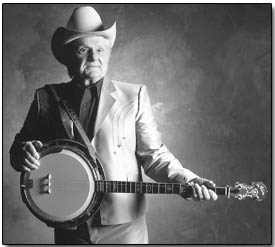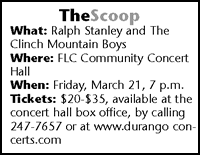|
A converation with Ralph Stanley
written by Missy Votel
 When
it comes to staying power, Ralph Stanley knows a thing
or two. Not only does he deliver a haunting, trembling
tenor that stays with a listener long after a song’s
ending, but he’s done so for more than half a century. When
it comes to staying power, Ralph Stanley knows a thing
or two. Not only does he deliver a haunting, trembling
tenor that stays with a listener long after a song’s
ending, but he’s done so for more than half a century.
Stanley’s resume at 76 reads every bit the living
legend he is with three Grammys, a Library of Congress
award and numerous International Bluegrass Awards. He
credits his longevity to his down-home values.
“I took pretty good care of myself; I lived a clean
life,” he said Tuesday from his home in Coeburn
County, Virginia. “I guess the Lord has blessed
me.”
And with a two-year-old granddaughter climbing on his
knee, one gets the feeling Stanley is every bit the genuine
article he says he is.
 “I
think the reason I’ve lasted so long is because
I’m making the same old-time sound that I started
with,” he said. “I believe in sticking with
what you start with. I do it like I feel it, and I think
that’s the reason I’ve stayed around so long.” “I
think the reason I’ve lasted so long is because
I’m making the same old-time sound that I started
with,” he said. “I believe in sticking with
what you start with. I do it like I feel it, and I think
that’s the reason I’ve stayed around so long.”
Indeed, even the name of Stanley’s band, the Clinch
Mountain Boys – named for the Clinch Mountains of
Virginia where he was born in 1927 – has remained
steadfast over the years. It was here that Stanley first
picked up a banjo, learning his famous “clawhammer”
style from his mother. By 1946, Stanley and his older
brother Carter were playing regular radio gigs under the
Stanley Brothers moniker. A year later, the two made their
first recording, paving their way toward becoming renowned
purveyors of bluegrass, a sound pioneered by their contemporary
Bill Monroe. And although to this day Stanley’s
music is still classified under the bluegrass genre, he
contends it may not be the best description of the rustic
Stanley sound.
“Sometimes I don’t call mine bluegrass,”
he said. “It’s more old time, more in the
mountains. Mine is a bit older.”
And although the years between 1949 and 1952 are considered
by many to be the Stanley Brothers’ heyday, it wasn’t
until recently that Stanley struck gold – or more
precisely, platinum – with his music. In 2001 the
soundtrack from “O Brother Where Art Thou,”
which features Stanley’s a capella version of his
classic “O Death,” the Stanley Brothers’
“Angel Band,” as well as Stanley’s “Man
of Constant Sorrows” covered by Union Station, broke
the 5-million mark.
“‘O Brother’ got me a lot of new listeners,
new fans I never would have had,” he said. “I’ve
got a third more fans now than before.”
Stanley, who has been on his own since the death of his
brother in 1966, also has gained the admiration of many
peers. Over the years, he has collaborated with artists
ranging from Bob Dylan and BR-549 to Iris DeMent and Lucinda
Williams. His band has been the springboard for many a
young bluegrass superstar, including Ricky Skaggs and
the late Keith Whitley. Likewise, the music of the Stanley
Brothers has been revived by younger artists from Emmylou
Harris and Gillian Welch to Dan Fogelberg and Dwight Yoakum.
Perhaps the most notable development of the bluegrass
sound pioneered by the Stanley Brothers, Monroe and Earl
Scruggs is the “newgrass” movement, made popular
by modern bluegrass artists like Sam Bush and Bela Fleck.
And while today’s newgrass artists may share roots
with traditional bluegrass musicians, the similarities
end there, Stanley said.
“They don’t play traditional bluegrass,”
he said. “I think they might be in a different category.”
And it’s a category Stanley admits he could live
without.
“I don’t care for it,” he said. “I’m
more traditional. I think they went a little too far out.
And I think Bill (Monroe), if he were living today, would
feel the same.”
And while the newgrass scene grows, Stanley said he is
content to keep on doing what he’s been doing, albeit
at a somewhat slower pace than he’s accustomed to.
“I typically do 180 to 200 shows a year,”
he said. “I have cut down a lot. I’ll be doing
about half that this year.”
However, this is not to say Stanley, who has some 185
albums to his credit, will be slowing down with his recording
career.
“I just signed a contract with Columbia for 6 CDs,”
he said. “I made one and I’ve got to make
another in 30 to 60 days.”
Stanley said in addition to featuring a capella and “old-time
songs,” the upcoming release will be a tribute to
the Carter family, considered the first family of country
music and forebearer of June Carter-Cash.
“They recorded in 1927 from the same county that
I’m from,” he said. “I heard them when
I was a little boy.”
As for the show he intends to bring to Durango, Stanley
said his fans can expect to hear exactly what they came
for.
“I will bring along traditional bluegrass, the
way it was when it started and the way it should be,”
he said.
|

